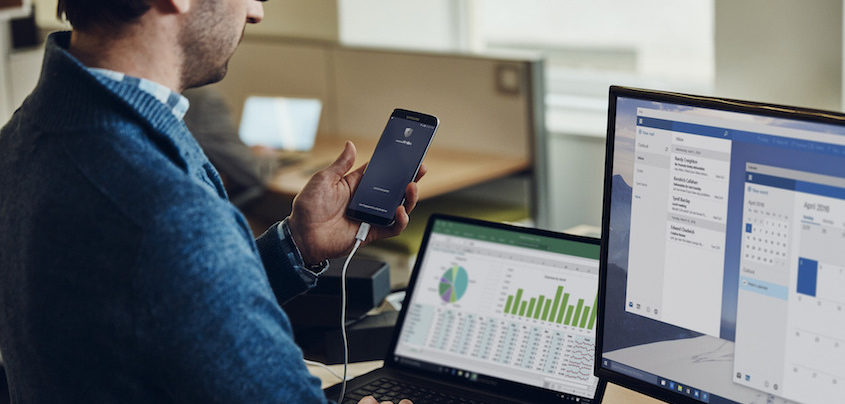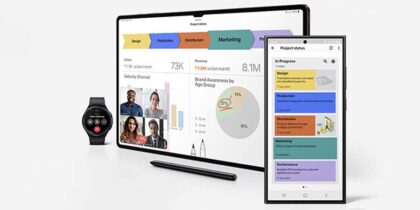Consider this scenario: Three day traders are eating lunch in the cafeteria of a major financial institution where they work. Only one has a Samsung Galaxy Phone, and the two other traders have mobile devices from different manufacturers. All three phones have Eikon, a mobile app from Thompson Reuters that provides instant anytime industry analysis. Like many in the finance industry who deal with mobile banking services, the traders rely on this app for the real-time financial and political news alerts that they need for competitive advantage with their trades. Everything is about timing for these traders, so anything that gives them a jump on live instant data as it’s received is imperative.
Suddenly, a major news story breaks on Eikon before it’s released via other news sources: A well-known firm has just announced that it is about to acquire a major competitor. In other instances, when the announcements don’t require as high a degree of security, all three of the traders would likely have the alert delivered to their device at the same time. But in this case, the information is so confidential that Eikon doesn’t push the story to all three of the phones at once. Only one phone gets it — the Samsung.
This is because Eikon takes mobile app security seriously, and is cautious about assuring that any device they publish sensitive information to offers maximum data protection. As a result, only the trader using the Samsung smartphone gets the early tip-off. The Samsung phone chirps, the trader looks at it and then runs off to make a trade. The other two traders are left sitting in the lunchroom wondering, “What the heck? Why didn’t I get that notice?” The reason that these smartphone users on non-Samsung devices didn’t get the critical news flash in advance is because their devices cannot be trusted with the information.
Mobile Technology Is Changing the Face of Finance
Learn crucial mobile security compliance tips in this infographic. Download Now
More Confidential Data, Higher Risks
I’ve seen situations like the one above with increasing frequency — and traders aren’t the only ones who need to worry more about data protection when it comes to mobile banking services and mobile app security. The popularity of mobile banking is on the rise, which means that the finance industry and consumers alike must be on guard against a slew of new types of threats and security vulnerabilities.
The Federal Reserve reported in 2016 that 53 percent of all smartphone users who had a bank account had used mobile banking in the year prior to the study, an increase from the previous year. People now routinely use mobile banking services to check their account balances, transfer funds, receive account-related notifications and make mobile payments.
A recent report from KPMG found that by 2020, the number of global mobile banking users is expected to climb to include more than a quarter of the world’s population — around 1.8 billion people. Exponential growth is expected to continue in this sector for the next decade, according to these findings.
Added adoption of mobile banking services means that banking and finance leaders must increase their vigilance and defense strategies against emerging threats to their customers and in-institution programs. These threats include mobile malware and ransomware, untrustworthy third-party apps, unsecure Wi-Fi networks and risky actions taken by consumers or even finance employees who inadvertently — or wittingly — put confidential data at risk. What’s more, even if a financial firm uses a third-party app for mobile banking services instead of a proprietary one, the company is still liable.
Needed Lockdown
With these global realities in mind that make mobile banking services increasingly vulnerable to security shortfalls, let’s revisit the trio of day traders above. Why is it that Thompson Reuters decided that only the Samsung device is secure enough for its most sensitive news alerts? The reason is that Samsung provides an added layer of mobile app security through the power of its Samsung Knox security platform and Knox-enabled App.
Thompson Reuters realized that sometimes the data they want to share could be considered confidential with a higher need for security — so they looked at how the Samsung Knox platform works and were pleased. There are many reasons that Gartner rated Knox the strongest out of any security platform in its 2016 comparison of platforms for mobile device security. Here are a few points that were important to Thompson Reuters that should lend confidence to financial companies seeking a secure security platform:
- Samsung Knox is built directly into the device’s hardware and continuously checks for changes during use. This capability is not something an operating system can do or even see, since it all happens below the operating system, the app layer and even the kernel.
- When the Eikon app is downloaded to a Samsung device, the app is able to know or detect that it has a hardware-secure platform before deciding whether to connect to it.
- When the app is on a Samsung device with the Knox platform, if that device has ever been tampered with or cracked at a hardware level, or is in a position to be hijacked or compromised, the app will be notified.
- If a device is considered no longer valid, the app can be blocked and locked down or even destroyed, wiped and erased if the data gets into the wrong hands.
Without a doubt, the finance industry faces greater challenges than most others because of the need to safeguard sensitive financial information. Whether executing trades or managing personal checking and savings accounts, customer investments or the company’s investments, the data that finance professionals touch is of critical importance and is not always replaceable. This means that company infrastructure should include hardware and software that can detect irregularities on multiple levels and keep valuable information secure at all times.
Stay in tune with the latest digital financial services trends by checking out our complete line of finance technology solutions.











